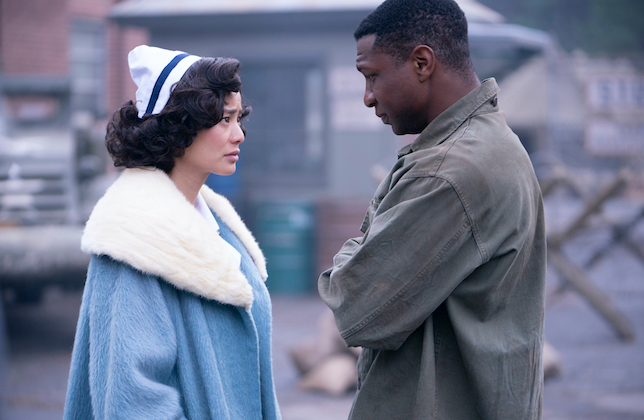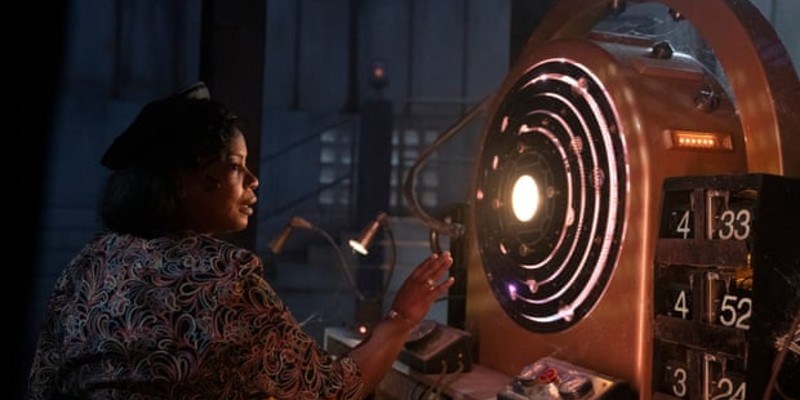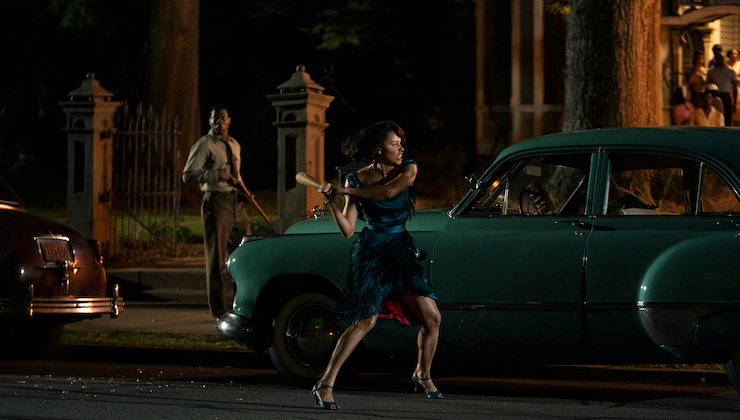The first season of HBO’s Lovecraft Country has come to an end. After ten weeks of genre-bending, thematically challenging, visually compelling storytelling, we are left with a dense crop of episodes to unpack. Adaptation from one medium to another is always difficult. By the end of the season, Misha Green’s television show establishes itself as something separate from Matt Ruff’s book. However, in achieving that separation, the show occasionally struggles to find its footing. Still, the cast’s incredible performances and Green’s exploration of these rich characters made for a powerful piece of television.
MAJOR SPOILERS FOR SEASON ONE BELOW
MAJOR SPOILERS FOR SEASON ONE BELOW
MAJOR SPOILERS FOR SEASON ONE BELOW:
Misha Green’s first season covers the same ground as Ruff’s book. We follow Tic (Jonathan Majors, an excellent series lead) as he discovers his family’s magical heritage. It is a birthright that has been kept from him, and now Tic must discover how to get it back.
Tic’s journey starts when his estranged father, Montrose (Michael Kenneth Williams), goes missing. Tic, his uncle George (Courtney B. Vance), and his childhood friend Leti (Jurnee Smollett), track him to Ardham, Massachusetts, where they discover that Montrose is a “guest” of Samuel Braithwaite (Tony Goldwyn). However, nothing is as it seems at the Braithwaite Manor. The Braithwaites are members of a magical cult called the Order of the Ancient Dawn. The founder, Titus Braithwaite, raped Tic’s ancestor, Hanna, who was enslaved by the family. When she fled, she was pregnant with his child. Thus, the magical Braithwaite bloodline split and was passed down to Tic. His blood contains the powerful magic Samuel needs to complete his spell for eternal life––but not every Braithwaite is on board with Samuel’s plan. His daughter, Christina (Abbey Lee), seems to be disgusted by the whole thing; the Order of the Ancient Dawn reeks of White Male Supremacy, emphasis (for her) on the Male. But her motives aren’t entirely selfless. She doesn’t want to tear down this patriarchy, she wants to place herself at its head.
Samuel’s spell fails and results in his death, the deaths of his acolytes, and the destruction of the Braithwaite manor. Tic manages to escape unscathed but, heartbreakingly, in one of the largest changes from the book and most shocking deaths of the season, he is unable to save Uncle George, who dies in his brother Montrose’s arms.
Tic, Leti, and Montrose return to Chicago. There we meet George’s wife, Hippolyta (Aunjanue Ellis), their daughter Dee (Jada Harris), and Leti’s estranged sister, Ruby (Wunmi Mosaku). However, the Freemans aren’t given much time to grieve because the magic they found in Ardham has followed them home. Because of his magic blood, Christina manipulates Tic, and those he cares about, into helping her locate stolen pages from The Book of Names, a magical tome that’s pivotal to her plans. She’s prepared to use every tool in her arsenal to acquire them, including a metamorphosis spell that allows her to inhabit the body of her former lover, William (Jordan Patrick Smith). However, Tic is just as suspicious of Christina as he was of her father. With our two opposing forces set up, Lovecraft Country pushes them towards an inevitable showdown.
Through their efforts to secure the pages, Tic and Leti go from being terrified of magic, to learning how to master it. They also go from being friends to being lovers. When Leti learns that she is pregnant, Tic’s need to protect his family increases tenfold.
“I realized this magic was not something to be feared, but a gift to pass on.”
Tic’s journey also leads him to a person from his past, Ji-Ah (Jamie Chung). She is a kumiho, a nine-tailed fox demon that takes the form of a beautiful woman, who he fell in love with while serving in the Korean War. She is haunted by a vision of his death, and repeatedly tries to get him to abandon his quest.
Through a series of shared visions, Tic and Leti realize that Hanna didn’t just flee with her unborn child, she fled with the Book of Names in its entirety. Christina is willing to manipulate, torture and kill for a few pages and his family has been hiding the whole book. This stunning revelation is short lived when his family divulges that everything they had was lost when their home was burned down in the 1921 Tulsa Race Massacre.
Meanwhile, Uncle George’s widow, Hippolyta discovers a multiverse machine and goes on a journey of self-discovery. When Tic tries to find her, he ends up visiting the future and returns with the book Lovecraft Country (yes, the book the series is based on!). In this case, it’s written by his son, not Matt Ruff, and the book details the events that are to come, specifically, Christina’s real plan. She plans to cast an immortality spell that will result in Tic’s death.
When Christina’s enemies curse Hippolyta’s daughter, Dee, Hippolyta returns from her journey in order to save her daughter by doing the impossible. Just as Tic went to the future, Hippolyta plans to go to the past to retrieve the Book of Names from Tic’s family home in Tulsa.
After an emotional night in Tulsa, they return with the Book of Names and visit Tic’s ancestors. The ancestors reveal the birthright that was lost to Tic and Leti. His ancestor Hanna, who once feared magic, realized it was something that she could possess and pass down to her children. Hanna tells Tic her plan to save everyone and claim magic for the Freemans.
Our heroes return to Ardham and use the Book of Names to enact Hanna’s spell, which will bind Christina from using magic. But Christina is already one step ahead of them. Christina disguises herself as Leti’s sister Ruby and sabotages their plan. Tic is captured and her spell is started.
By draining Tic of his blood and murdering him, Christina succeeds at attaining immortality. But Leti and the ancestors aren’t done yet. When Ji-Ah uses her powers to connect Tic and Christina’s bodies, Leti completes Hanna’s spell. Christina––and every white person––in the world is bound from using magic. Magic belongs exclusively to the Freemans. What was promised to Tic by birth is achieved through his death.
When it comes to the season’s main story arc, Green sets up a generative narrative that can keep going episode after episode. She does this by restructuring the plot and changing the characters. While many changes raise the stakes and deepen relationships, the shadows of the book haunt the show. Some changes make for lovely moments of depth, while others leave the show feeling foggy and thin.
George’s death is one of the largest changes from the book, and his absence really changes the relationship dynamics in the rest of the season. From a dramatic standpoint, his death is a good way to create conflict. By removing George as a father figure, Tic and Montrose are forced to face each other and examine their father-son relationship. Hippolyta’s grief fuels her need to find purpose now that George is gone, leading to her journey of self-discovery. And for Dee, George’s death isolates her. When she must face off against the terrifying Topsy and Bopsy (Kaelynn Gobert-Harris & Bianca Brewton), we truly fear for her life. However, without George, we lose the triangle of tension between Tic, George, and Montrose that was so central to the book. Also, in removing such a major character, the show has to fill that space. Montrose is a wonderful substitute, but it’s not enough––George’s absence is felt acutely throughout the series. Occasionally, flashbacks are needed to bring him back in order to maintain the other characters’ development.
Another surprising pair of deaths are Tic and Ruby’s. In Ruff’s book, they survive the final ordeal. Maybe that’s why I’m not totally sold on their departures. Killing off the main character is a solid way to make me invested in the next season, and Tic’s death effectively breaks open the world and leaves things wide open for season two. As with George, it’s a great way to create conflict and change up relationship dynamics, but as with George, I’m concerned about how the show will hold up without Tic’s presence. However, the first season shows our heroes achieving the impossible, so a part of me strongly suspects that this isn’t the last time we’ll see Tic and Ruby.
In the book, Caleb Braithwaite wields his whiteness in tandem with his magic. By turning Caleb into Christina, Green gives the character more obstacles to overcome. When she literally steps into William’s body, she gets to wield both her race and his gender as she sees fit. This divergence from the book is a stroke of theatricality that really works. Giving Christina more obstacles means that she must be ruthless. This quickly establishes her a formidable adversary. The deconstruction of whiteness down to its gender dynamics is a smart way to both deepen and manifest the themes Lovecraft Country is engaging with.

Also, Green introduces Ji-Ah, a character totally original to the series. While she could easily stay on the periphery, by giving her a standalone episode (“Meet Me in Daegu”), Green uses her to illuminate Tic’s service in the Korean War, something that was referred to only in passing in the book. Green presents a Korean War narrative we’ve seen before, but in a new way. Ji-Ah introduces the idea of magic beyond the Order of the Ancient Dawn and whiteness. She also shows us the violence and horror Tic has been running from since before the series began. Her character illustrates a cycle of horror and trauma that smartly expands the world of the show.
The cast is the shining star of Lovecraft Country. Jonathan Majors in an incredible series lead. He brings strength mixed with an incredible vulnerability to Tic. This makes him insanely watchable. Jurnee Smollett is a seasoned professional and it shows. She has an ease in Leti, even in scenes of intense emotion. We aren’t watching her play Leti, we are watching her be Leti. Her performance in “Holy Ghost” is a masterclass in how to inhabit massive circumstances with specificity, humanity, and bravery. Michael Kenneth Williams does consistently stunning work and manages to be emotionally naked in front of the camera in a way that is truly heartbreaking. The supporting cast is equally deserving of praise: Aunjanue Ellis, Wunmi Mosaku, Jada Harris, Abbey Lee, Jamie Chung, and Jamie Neumann, all showed up ready to throw down, and you can tell. It’s wonderful to witness.

Ruff’s novel is episodic. As a television show, this episodic structure translates into shifting genres between episodes. Every episode delves into a different aspect of the horror genre, like a “story of the week.” The shifts are fun, but they are most successful when the show goes all in. “Meet Me in Daegu” and “I Am.” exemplify this, and are the strongest episodes of the season.
“Meet Me in Daegu” is a beautiful example of storytelling. By removing us from the main setting and dropping us into a new world, Green keeps us on our toes. Well plotted, with satisfying reveals throughout, the show took a risk with this episode and it paid off.
In Hippolyta’s episode, “I Am.”, she embarks on a journey that’s delightful, surprising, and incredibly moving. It explores Hippolyta as a Black woman restrained by both her external and internal worlds. The setup is deceptively simple: an alien entity asks Hippolyta to name herself. As she tries to do that, she is transported to different places and times. She begins to crack open right in front of our eyes. Each place she visits on her journey is surprising, but it is also exactly where she needs to be. There are countless references and easter eggs, but the action keeps moving forward. We discover Hippolyta as she discovers herself. This mixture of genre, specificity, and surprise is Lovecraft Country at its best.
“I don’t know what’s more difficult: being colored or being a woman. Most days I am happy to be both, but the world keeps interrupting and I am sick of being interrupted.”
Throughout the season, the show does an excellent job portraying complicated Black female characters. Yes, these Black women are brave, caring, and strong. They also get to be angry, horrifying, and selfish. These Black women are flawed humans and it is so damn refreshing to see. In this respect, the raw material from Ruff’s book is taken to a new level in Green’s show. In the episode “Strange Case,” she really explores the moral quandary that Ruby engages in when she wears a white woman’s body. In this body, gets the job she’s always wanted and is treated with the respect she deserves, but she loses herself in the process. Green has a wonderful way of asking her characters tough questions, and leaving them with even more difficult answers.
However, occasionally, the show gets bogged down in the energy it exerts in trying to separate itself from the source material. In storytelling, especially in horror, I love confusion. I’m happy to start in the dark and slowly turn on the lights. But when I’m kept in the dark for too long, it can be hard to figure out what information is important to the action of the story. For me, this is a weak point in Green’s adaptation. Episodes are jam-packed, and when they are tightly plotted, it makes for dynamic television. The pilot episode, “Sundown,” exemplifies this: it’s full of references, setup, and foreshadowing while still keeping the main story moving and focused. But, in an episode like “A History of Violence,” the plotting isn’t as tight and it quickly becomes hard to differentiate between information needed for the plot vs extraneous information. Some television shows are meant to be puzzles; however, the pieces should still be well-defined.
Also, for a show that broke ground for representation, the mishandling of Yahima, an Arawak Two-Spirit character, must be mentioned. The introduction and near-immediate murder of Yahima shuttled the character into a painful trope. They existed solely as a magic device for the main characters, while their humanity was negated and their gender identity hand-waved away. This parallels the same types of characterizations Black creatives have been fighting against for decades. Yahima deserved better, and, thankfully, show runner Misha Green agrees.
While the show can be uneven, it’s ambitious, and I would much rather watch a television show that tries to do too much than one that doesn’t do anything at all. It had some of my favorite moments of television this year. The soundtrack and audio references alone made my geeky heart swell with pride. Sonia Sanchez’s poem “Catch the Fire” paired with the Tulsa sequence gave me chills. I will forever be jealous of Hippolyta’s time with Josephine Baker. And, let’s be honest, Leti bashing racists’ car windows in with a baseball bat is the mood of 2020. Each week, I was excited to go along for the ride. Also, in the larger scheme of things, I can’t remember that last time a Black show was allowed to take this many risks in themes and content and was given the budget to make it happen. I, for one, hope Misha Green is given another opportunity to make more complicated and challenging television with season two.
There are plenty of questions to keep us occupied while we wait for news about a possible second season. Below are the ones that will be racing around in my head until then:
What’s going on with magic?
Now that the Freemans have magic, what are they going to do with it? The scales have shifted in their favor and I suspect season two will deal with everything that comes with this new power. Also, now that white people no longer have magic, will they try to come after the Freemans?
What does the future look like?
We get a glimpse of the future with the riots that Tic saw, but is that future guaranteed after everything that’s happened?
Tic and Ruby: Are they really gone?
My heart! This just might be my own denial, but I really don’t think it’s over. Leti has the Book of Names. And if there is a way to bring them back, Letitia muthafuckin’ Lewis is going to find it.
Dee!
No questions here, just a powerful statement. It makes sense that Dee gets the last scene of season one. Now, she is the powerful girl controlling the monsters and Christina is begging for mercy. After our journey through this season, when Dee kills Christina, her vengeance feels satisfying. It also leaves us to wonder about the world we are now in. For me, it has echoes of the incredible Kimberly Jones interview: “[T]hey are lucky that what black people are looking for is equality and not revenge.” For me, this is where the season ends. Now that the Freemans have power, do they want equality or vengeance, and what happens if those are the same thing?



